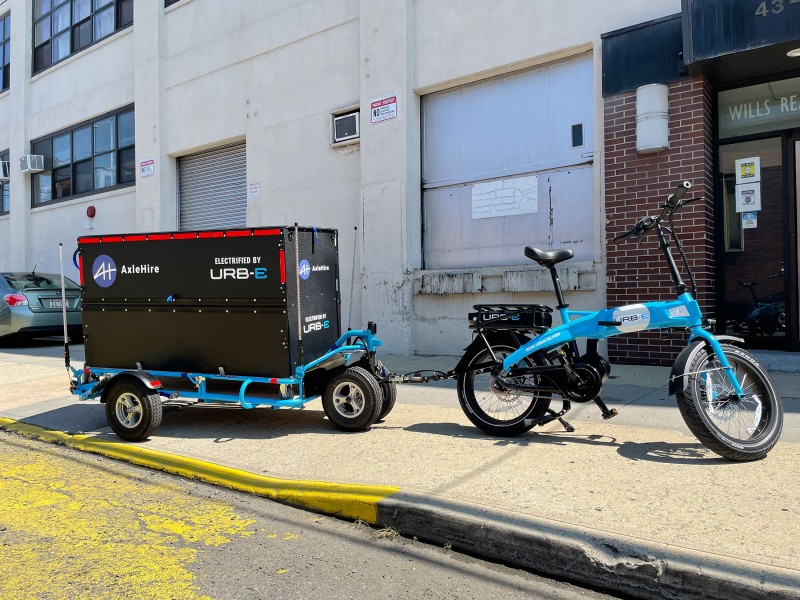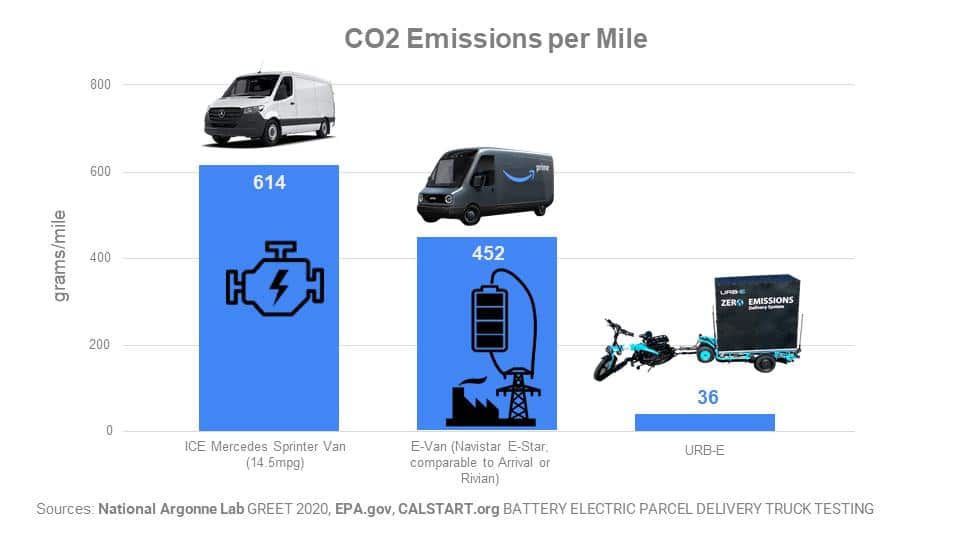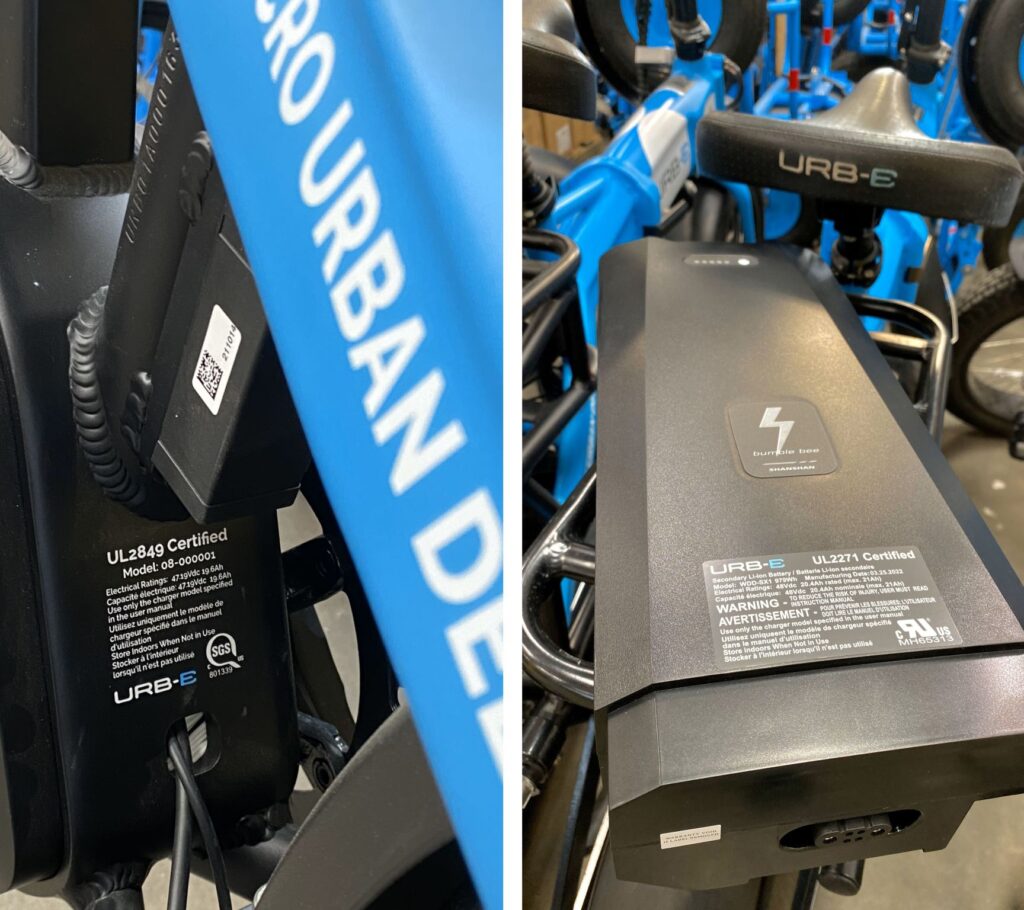The Dirty Little Secret of Electric Delivery Vans
Staggering amounts of money have flown into the development of electric delivery vans, touted as the climate friendly solution to the exploding volume of e-commerce delivery. Amazon and Ford invested a combined 2.5 billion dollars in Rivian, Hyundai, Kia and UPS invested hundreds of millions into UK based Arrival, and GM is developing their own “Brightdrop” brand of trucks.
But electric vans have a dirty little secret that is mostly omitted from the discussion. Electric delivery vans, just like their gas powered ancestors, are heavy pieces of machinery that require a lot of energy, just to move the vehicle around. A typical electrical van weighs north of 7,500 lbs and can carry about 2,000lbs of payload. The weight of the vehicle by far outweighs the weight of the cargo.

For the weight penalty one gets a vehicle that is capable of traveling at Freeway speeds over hundreds of miles. For inner city and suburban delivery though, the extra weight causes an exorbitant increase of wasted energy. Combined with the fact that the majority of the electricity in the US (and worldwide) is generated from fossil sources, all of a sudden the “clean” electric vans become pretty large polluters in their own right, creating about 70% of the CO2 emissions of a conventional gasoline van.
That doesn’t even include the vast amount of energy needed to produce the Lithium-Ion batteries in the first place, a process that releases enough CO2 to operate a gasoline van for 8 months. The dirty little secret is that electric vans are not clean if they are used in a city. They have a use case when it comes to transporting packages over longer distances, but they are woefully inadequate for delivering packages in an inner city and in dense suburbs where they waste large amounts of climate changing energy and contribute to gridlocked streets.
This is where bike based vehicles have a clear environmental advantage. With a much better weight-to-package ratio and a significantly smaller footprint, bike based cargo vehicles reduce CO2 emissions by over 95% compared to gasoline vans.

And last miles do add up. At URB-E we are tracking every mile that our bikes and trailers travel and just on the relatively small island of Manhattan, they have racked up 50,000miles in the last 9 months alone, delivering ten thousands of packages and saving more than 60,000lbs of CO2 in the process.
With all these obvious advantages for society, why haven’t cargo bikes been adopted more widely then? Find out more at URB-E.
New York did the right thing to allow only certified Lithium-Ion e-bike batteries in the city
There have been 216 fires in the city last year that were caused by batteries going up in flames, mostly when people were charging them in their apartments. Tragically 6 people died in those fires and over 100 were injured.
What’s easily overlooked in the discussion is the fact that there is a large difference in safety between cheap Chinese batteries and certified quality batteries. To my knowledge none of the fires were caused by a UL certified battery.

A quality product costs more to develop and manufacture, but human life is priceless.
URB-E invested early in battery safety, with careful supplier selection, factory audits and full certification of bike and batteries to UL standards.
About URB-E
URB-E is the compact container delivery network, replacing trucks with small electric vehicles designed for every neighborhood.
You can see URB-E’s electric-powered, collapsible containers around New York and other urban locations, enabling fast, clean last-mile delivery for major retailers and e-commerce companies.
URB-E’s containers replace an entire delivery van, reducing emissions by 94% and increasing delivery efficiency by 2-3 times. A single rider can move over 800 pounds of goods through city streets faster and more sustainably than traditional delivery trucks.
The containers save a massive amount of space in crowded urban environments, with 20 folded containers fitting into a single parking space.
URB-E is venture-funded, backed by UBS Group, and headquartered in Los Angeles, CA.
About Guest Author, Sven Etzelsberger CEO / CTO, Co-Founder at URB-E

Etzelsberger is an executive, entrepreneur and inventor with 23 years of experience in automotive engineering, with global OEMs (Porsche, Ford, Fisker) and 7 years start-up in urban mobility. He is experienced in taking products from ideation all the way through to production while simultaneously building an empowered and motivated organization. Etzelsberger is creative in problem solving with numerous patents in production. Solid business and financial acumen to frame engineering decisions in an economic context.

